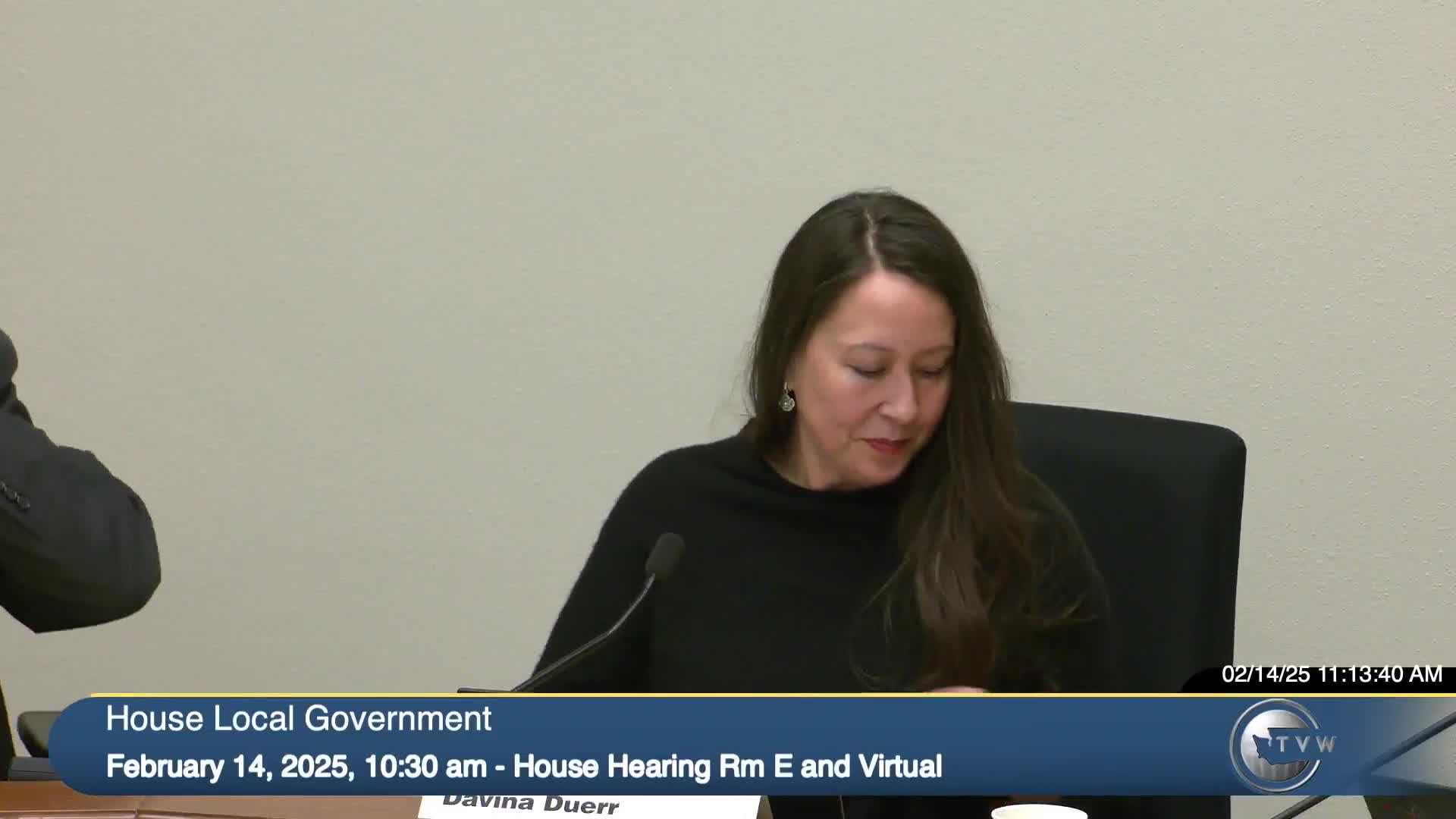Local Government Committee reports out bills on trails, WUI code, embodied carbon, planning deadlines and alarms; votes recorded
Get AI-powered insights, summaries, and transcripts
Subscribe
Summary
The Local Government Committee on Feb. 14 reported a package of bills to the House, advancing measures on trails, wildfire building-code adoption, embodied‑carbon standards, planning deadlines, firefighter pension boards and alarm-system rules.
The Local Government Committee advanced a slate of bills on Feb. 14, reporting several to the House with due-pass recommendations. Committee members debated measures on trails, wildfire building codes, embodied-carbon building standards, comprehensive-plan timing, firefighter pension board designees and rules for electric alarm systems. Votes were held and tallied on multiple items.
The most contested measures were three bills that passed on 4–3 votes: HB 18-14, HB 12-54 (proposed substitute), and HB 14-58 (proposed substitute). Unanimous or near-unanimous reports included substitute HB 1700 (7–0), HB 17-98 (7–0) and HB 16-88 (7–0).
Summary of key bills and committee debate
HB 18-14 — Trails SEPA exemption (reported out, due pass; 4–3) HB 18-14 would provide a categorical exemption from the State Environmental Policy Act (SEPA) for decisions regarding paths and trails that meet certain criteria and requires applicants seeking the exemption to consult meaningfully with any affected federally recognized tribe. Representative Hunt urged a yes vote, saying “Trail connectivity is very important.” Ranking Member Clicker said the minority would oppose, citing concerns about losing inventory and impacts on adjacent properties. Roll call recorded: Representative Dior — aye; Representative Partially — aye; Representative Clicker — nay; Representative Stevie — nay; Representative Griffey — nay; Representative Hunt — aye; Representative Zahn — aye. Staff announced 4 ayes, 3 nays.
HB 12-54 (proposed substitute) — Wildland‑Urban Interface (WUI) code adoption process (reported out, due pass; 4–3) The substitute to HB 12-54 would allow the State Building Code Council to adopt the International Wildland‑Urban Interface code in whole or in part, require statewide wildfire hazard maps before full adoption, permit optional local WUI adoption until statewide maps are complete, and require state-level consultation on defensible-space requirements. The committee adopted amendment ALI 4 11, which requires State Building Code Council approval of city/county amendments that affect single‑family or multifamily residential buildings before those local amendments take effect. Representative Griffey argued against full adoption of the WUI code, raising concerns about prescriptive requirements, cost increases and whether the approach mirrors California’s experience. Roll call recorded: Representative Duer — aye; Representative Toher — aye; Representative Partially — aye; Representative Clicker — nay; Representative Stevie — nay; Representative Griffey — nay; Representative Hunt — aye; Representative Zahn — aye. Staff announced 4 ayes, 3 nays.
HB 14-58 (proposed substitute) — Reducing embodied carbon in buildings (reported out, due pass; 4–3) Substitute HB 14-58 would require the State Building Code Council to adopt rules on embodied-carbon reduction standards, set data reporting requirements, and require a 30% embodied-carbon reduction target for the 2030 state building code for covered projects. The committee adopted a technical amendment (ALI 4 12) and debated availability of low‑carbon products and potential cost impacts. Representative Griffey cautioned about supply and cost effects on housing; supporters said the changes align industry trends. Roll call recorded: Representative Doer — aye; Representative Partially — aye; Representative Clicker — nay; Representative Stevie — nay; Representative Griffey — nay; Representative Hunt — aye; Representative Zahn — aye. Staff announced 4 ayes, 3 nays.
HB 1700 (substitute) — Timing for comprehensive-plan updates (reported out, due pass; 7–0) Substitute HB 1700 would extend the deadline for counties and cities with comprehensive-plan updates due in 2026 by six months to Dec. 31, 2026, and originally included a provision about capital facilities updates for cities that was removed by amendment RIC 3 78. Committee members emphasized the administrative burden of comprehensive-plan updates and supported a short extension; the committee reported the substitute 7–0.
HB 17-98 — County auditor/treasurer designees for firefighter pension boards (reported out, due pass; 7–0) HB 17-98 allows county auditors and treasurers to appoint designees to serve on prior‑act firefighter pension boards. Committee members who had served on such boards described shrinking membership and supported the change. The bill was reported out 7–0.
HB 16-88 (substitute) — Statewide standards for electric security alarm systems (reported out, due pass; 7–0) HB 16-88 would establish statewide standards for installing and operating electric security alarm systems where local jurisdictions have not adopted alternative regulations. The committee adopted amendment RUS M 159 to clarify the definition of outdoor storage property; supporters said the bill preserves local authority where jurisdictions have already acted. The substitute was reported out 7–0.
Votes at a glance
- HB 18-14 (trails SEPA exemption): reported out, due pass — 4 ayes, 3 nays (Dior, Partially, Hunt, Zahn = ayes; Clicker, Stevie, Griffey = nays). - HB 12-54 (WUI substitute, with ALI 4 11): reported out, due pass — 4 ayes, 3 nays (Duer/Toher, Partially, Hunt, Zahn = ayes; Clicker, Stevie, Griffey = nays). - HB 14-58 (embodied carbon substitute): reported out, due pass — 4 ayes, 3 nays (Doer, Partially, Hunt, Zahn = ayes; Clicker, Stevie, Griffey = nays). - HB 1700 (comprehensive-plan timing substitute): reported out, due pass — 7 ayes, 0 nays. - HB 17-98 (firefighter pension boards): reported out, due pass — 7 ayes, 0 nays. - HB 16-88 (electric alarm systems substitute): reported out, due pass — 7 ayes, 0 nays.
Committee action will move the measures to the next House floor steps; several items drew substantive debate and amendments related to local control, cost impacts, and interagency mapping and consultation requirements.
